Brüno , Sacha Baron Cohen and director Larry Charles' follow-up to Borat (2006), is an audacious, ferocious combination of star vehicle, gross-out comedy and social commentary while simultaneously being one of the most ambitious and politically charged comedies of the decade. Not to mention a symphony of bad taste that pushes the R-rating so far into NC-17 territory that the MPAA might as well just dissolve and start over.
It's a problematic film as well. Cohen, in attempting to satirize homophobia, has created one of the most flamboyant gay characters in film history. Is he having his strudel and eating it too? The key to appreciating the film is to understand that Bruno, the gay Austrian fashionista, isn't really a character at all but a post-modern construct.
Combining a flimsy comic set-up (Brüno, disgraced in the Austrian fashion world, moves to America in hopes of becoming a celebrity) with illicitly filmed footage of his unwitting, bigoted prey, Cohen and Charles are less storytellers than performance artists. Key to the film is the implicit understanding that Bruno is Cohen or else the Candid Camera shenanigans wouldn't work. Brüno is not to be taken seriously as a depiction of a homosexual because he isn't even a real character but rather an exaggerated mask behind which Cohen the fearless comedian operates.
What a strange mix of emotions this film inspires. The film is genuinely disturbing - a major scene involving a caged wrestling match and a very homophobic crowd inspires the unsettling feeling of triumph mixed with horror, and scenes with the hideous Alabama "Gay Correctional Centre" turn Cohen into more a crusader than comedian (there is giddy pleasure in watching his confrontations with, say, Reverend Phelps's protesters).
Cohen manages potent jabs against the cult of celebrity (he gets star-crazed mothers to say some truly frightening things) and, of course, he is sometimes so funny and shameless that I actually laughed to the point of tears. Wait until you see his disastrous talk show pilot.
True, Brüno, the character/mask/construct, isn't admirable: he's narcissistic, ignorant and possesses very little sense of human decency. But the world around him - the one that persecutes him for his sexuality and has the potential to turn him into a celebrity for no real reason - is even worse.
Brüno is flamboyant but so what? He's harmless. When Brüno sparks gay panic in a group of he-man hunters or prejudiced National Guardsmen, Cohen and Charles seem to be asking: "what are you afraid of?"
(Universal)It's a problematic film as well. Cohen, in attempting to satirize homophobia, has created one of the most flamboyant gay characters in film history. Is he having his strudel and eating it too? The key to appreciating the film is to understand that Bruno, the gay Austrian fashionista, isn't really a character at all but a post-modern construct.
Combining a flimsy comic set-up (Brüno, disgraced in the Austrian fashion world, moves to America in hopes of becoming a celebrity) with illicitly filmed footage of his unwitting, bigoted prey, Cohen and Charles are less storytellers than performance artists. Key to the film is the implicit understanding that Bruno is Cohen or else the Candid Camera shenanigans wouldn't work. Brüno is not to be taken seriously as a depiction of a homosexual because he isn't even a real character but rather an exaggerated mask behind which Cohen the fearless comedian operates.
What a strange mix of emotions this film inspires. The film is genuinely disturbing - a major scene involving a caged wrestling match and a very homophobic crowd inspires the unsettling feeling of triumph mixed with horror, and scenes with the hideous Alabama "Gay Correctional Centre" turn Cohen into more a crusader than comedian (there is giddy pleasure in watching his confrontations with, say, Reverend Phelps's protesters).
Cohen manages potent jabs against the cult of celebrity (he gets star-crazed mothers to say some truly frightening things) and, of course, he is sometimes so funny and shameless that I actually laughed to the point of tears. Wait until you see his disastrous talk show pilot.
True, Brüno, the character/mask/construct, isn't admirable: he's narcissistic, ignorant and possesses very little sense of human decency. But the world around him - the one that persecutes him for his sexuality and has the potential to turn him into a celebrity for no real reason - is even worse.
Brüno is flamboyant but so what? He's harmless. When Brüno sparks gay panic in a group of he-man hunters or prejudiced National Guardsmen, Cohen and Charles seem to be asking: "what are you afraid of?"
